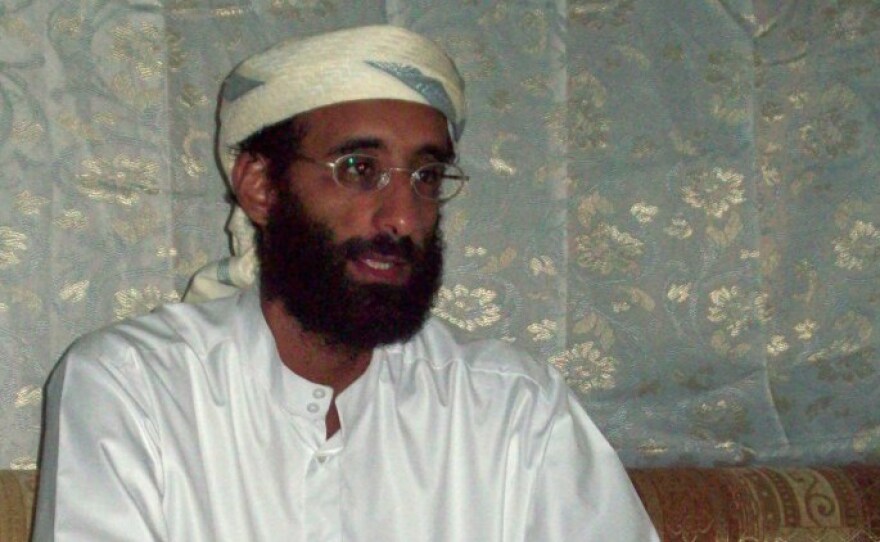Anwar al-Awlaki was born in New Mexico, educated in Colorado and spent years as a cleric in San Diego and suburban Washington, D.C. But in the past several years, he became a master al-Qaida propagandist whose sermons inspired jihadists worldwide before his death Friday by a U.S. missile on a desert road in northern Yemen.
Awlaki's journey from a childhood in Las Cruces, N.M., to the Arabian Peninsula placed him in the cross hairs of U.S. intelligence after he was linked to the failed "underwear bomber," the Fort Hood shooter and the foiled plot to bomb New York's Times Square.
First bin Laden and now al-Awlaki on a completely different continent. Terrorists around the world must be wondering when their time will come.
"First bin Laden and now al-Awlaki on a completely different continent," said Bruce Hoffman, a terrorism expert and professor at Georgetown University. "Terrorists around the world must be wondering when their time will come.
"If [terrorist leaders] have to devote more time to saving their skins, they've got less time to plan attacks," he told NPR.
A Popular Preacher
In 1994, Awlaki earned a bachelor's degree in civil engineering from Colorado State University. By his late 20s, he had become an imam and spiritual leader, first in San Diego and later at a mosque in Falls Church, Va., outside Washington. His soft-spoken lectures on Islamic scripture were recorded and distributed internationally, making him a celebrity among English-speaking Muslims around the world.
His gently persuasive style, much like bin Laden's, won over many converts.
"The non-Muslims say that Islam was spread by the sword ... is that true or not? Let's talk about what happened, and then you can make a judgment," he directed his followers in one audio posting on the Internet.
But U.S. counterterrorism officials say Awlaki's subdued manner belied his growing links to the international jihadist movement.
The 9/11 Commission's report released in 2004 indicated that Awlaki had met two of the Sept. 11, 2001, hijackers at the Virginia mosque, but the nature of those contacts is unclear.
In 2002, Awlaki left the U.S. and spent time in London before arriving back in Yemen two years later, where he continued to distribute lectures and sermons over his now-defunct website, including one entitled "The 44 Ways To Support Jihad."
Awlaki was considered a master propagandist for al-Qaida who helped shape the network's Yemeni-based affiliate into what American officials described as the most significant threat to the U.S. homeland.
Links To Fort Hood Shooting
Nidal Malik Hasan, the U.S. Army major accused of gunning down 13 people at Fort Hood, Texas, in November 2009, allegedly exchanged up to 20 emails with Awlaki. Hasan initiated the contacts, drawn by Awlaki's Internet sermons, and approached him for religious advice.
Awlaki has said he didn't tell Hasan to carry out the shootings, but after the attack, the Yemeni cleric praised the action on his website, lashing out at U.S.-based Muslim groups who condemned the attack and saying, "Nidal has killed soldiers who were about to be deployed to Iraq and Afghanistan in order to kill Muslims."
Officials also believe Awlaki went beyond his role as a propagandist for al-Qaida and became involved in operational planning for the al-Qaida in the Arabian Peninsula affiliate.
Yemeni officials have said Awlaki had contacts with Umar Farouk Abdulmutallab, the accused would-be Christmas plane bomber, who was in Yemen in 2009. They say they believe Awlaki met with the Nigerian, along with other al-Qaida leaders, in al-Qaida strongholds in the country in the weeks before the failed bombing.
The Pakistani-American man who pleaded guilty to the May 2010 Times Square car bombing attempt told interrogators he was "inspired" by Awlaki after making contact over the Internet.
But while his value as a propagandist is unquestioned, Awlaki's involvement in the operational side of al-Qaida is murkier.
Intelligence gleaned from Osama bin Laden's compound in Pakistan indicates that bin Laden and Awlaki corresponded, but that the Yemeni cleric was not viewed as a leader by the al-Qaida chief.
"Al-Awlaki's role [in al-Qaida] has never been that clear," Georgetown's Hoffman said.
"If he indeed managed to make this transition from cleric to skilled propagandist to operational leader, that's pretty unique," he said. "But what was his actual role in operations is up for debate."
NPR's Dina Temple-Raston contributed to this report, which contains material from The Associated Press
Copyright 2022 NPR. To see more, visit https://www.npr.org. 9(MDAzMjM2NDYzMDEyMzc1Njk5NjAxNzY3OQ001))






